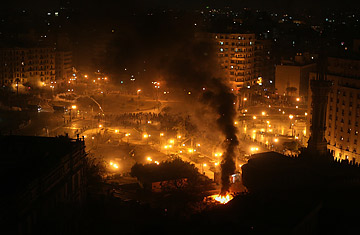
Police gather in Tahrir Square as a car burns in Cairo
(2 of 2)
"Tunis heated us up," Mohammed the taxi driver told me as we walked along to the next confrontation with the police. "We were asleep before, but if a country of 10 million can do it, so can we." He said he didn't belong to any particular political group. Meanwhile, people from apartments lining the streets threw bottles of water down to protesters heading down the Corniche, the large avenue along the Nile. "Vinegar, please, if you have vinegar," some of the protesters shouted back. Within minutes, several bottles plonked onto the sidewalk.
I met two sisters — Hala, 25, a final-year university student who didn't want to give her major, and her 27-year-old sister Salma, a pharmacist. They had traveled for two hours by taxi to participate in the protest. "Before, the opposition was fractured, but now we just have one demand: we don't want Hosni Mubarak. We want a strong economy. We don't want to be humiliated," said Hala, clad in an orange hijab and sweater. A 22-year-old engineering student who didn't want to give his name said, "I'm here because I've only known one leader in my lifetime." Mubarak has been President of Egypt for 30 years.
"Bread, freedom, social justice," the crowd chanted as it turned down Al-Agouza Street.
"We're just tired of the oppression. We're tired of the unemployment," Salma said. Then she was interrupted by the thuds of yet more tear-gas canisters. This time the police opted to overwhelm. They fired eight canisters into the crowd in quick succession, blanketing the area in a thick haze. People coughed and sputtered as they tried to escape via side streets and alleyways. Some vomited as they ran. And still the thud, thud, thud of more canisters.
"Mubarak has no feelings," one man screamed to the retreating crowd. "But what are we supposed to do? Nothing?"
A teenage boy offered a man with a white mustache his surgical mask. Some men carried their prayer mats from the mosque. As the demonstrators passed a local hospital, personnel in white lab coats distributed boxes of surgical masks to them, an act met with hearty applause.
Despite the strong blanket of tear gas still hanging in the air, the protesters headed back toward the police line. "We must have change," one young man told me en route to what was certainly going to be a melee.
After the crowd tried several times unsuccessfully to break through the same police cordon, only to be turned away by tear gas, I decided to make my way back to my hotel along the Nile. But the police choked off most of the roads around the city. A group of eight young men offered to escort me to the hotel. We walked for several hours — in pairs rather than as a group, lest the antiriot police consider us a threat and fire on us.
As we walked around Cairo, we could hear the rumble of protesters from several different quarters of the city. I didn't want to get the young men into trouble. They had traveled from Alexandria to protest. And I could see they were getting nervous. I thanked them for getting me as far as they did and told them I could find my own way.
As I headed down along the Corniche, a swank area that is home to several five-star hotels, the police tried to turn me back. Tired, I argued with the baton-bearing man in plainclothes refusing me entry. "Where do you want me to go? To sleep on the streets?" I said. "My hotel is down there."
Another man, alerted by my yelling, overruled the thug, and I passed through. I saw about 20 men in plainclothes, all carrying big sticks, coughing and sputtering along a side street, affected by their own tear gas.
The road was littered with debris. Billboards burned. I managed to get past another checkpoint, of 40 police in full riot gear. And then I ran into hundreds and hundreds of protesters heading toward me.
These young men were not like those I had encountered earlier in the day. They were a more destructive crowd. Many carried metal pipes, others sticks; some dragged metal barricades and burned garbage in the middle of the street.
As I was about to pass one hotel, the protesters turned on the building, hurling stones at its ceiling-to-floor windows, sending shattering glass to the floor. I crossed the street, retreating from the hotel.
My hotel was another 10 minutes away on foot. But the crowd was angry and still all around me. As I reached my building, I heard shards of glass breaking. It was my hotel's turn. The demonstrators succeeded in breaking several windows and then made a push to storm the hotel.
"Everybody downstairs," a hotel staff member screamed out, as men in white chef's uniforms and others in bellboy outfits rushed to physically barricade the doors. The staff placed tables and cabinets in the middle of the marble corridors: obstacles in case the protesters got into the hotel.
I walked up 12 flights of stairs. The hotel staff seemed to have kept the rioters at bay. That night the management decided to leave the hotel in darkness to make it appear to be abandoned and closed. Though Egypt was under curfew, it was very much on fire.
